German porcelain teeth zirconia, Emax, Cercon,… are popular types of German porcelain teeth on the market. Each type has different advantages and prices. My Auris Dental Clinic will compare types of German porcelain teeth, helping you choose the type that suits your needs and budget.
Learn about German porcelain teeth
What are German porcelain teeth?
German porcelain teeth are a type of false teeth used in dental restoration, to replace damaged, ugly or unaesthetic real teeth. German porcelain teeth are made from high-quality porcelain materials imported from Germany, famous for their outstanding quality and aesthetics.
German porcelain teeth are favored by many customers with dental aesthetic needs because of their high aesthetics, allowing the creation of teeth with natural colors, similar to real teeth. In addition, German porcelain teeth also have high durability, good chewing force resistance and high biological compatibility, safe for users’ health..
Advantages and Disadvantages of Porcelain Teeth Germany
Advantages:
- Aesthetics: German porcelain teeth often have natural colors, are clear and shiny, bringing natural beauty to the smile.
- Durability: German porcelain teeth are usually of high quality and durable, can withstand large chewing forces and are less susceptible to abrasion.
- Biocompatibility: German ceramic materials are highly biocompatible, causing little irritation to the gums and surrounding tissues.
- Staining resistance: Smooth ceramic surface, limiting staining from food and beverages.
- Duration of use: German porcelain teeth can be used for a long time if porcelain teeth are properly cared for.
Disadvantages:
- Price: German porcelain teeth often have a higher price than other types of porcelain teeth.
- Technical: Ceramic dental work Germany requires dentists to have high skills and dental clinics equipped with modern production technology.
- Feeling while chewing: In some cases, patient may feel a slight difference in feeling while chewing compared to natural teeth.
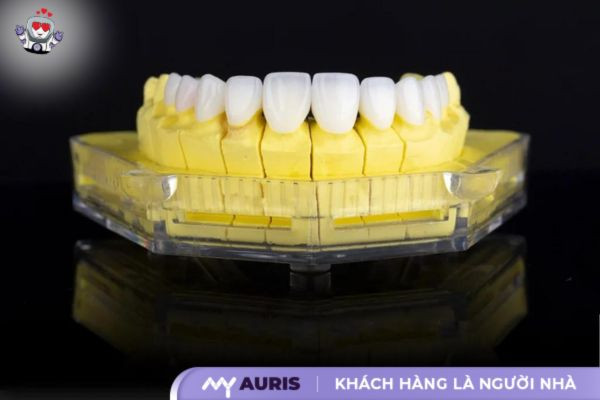
Types of Porcelain Teeth German
German porcelain teeth are divided into many types, each with its own characteristics and advantages and disadvantages. Choosing the appropriate type of porcelain teeth depends on the needs, dental condition and budget of each patient. Below are some popular types of German porcelain teeth:
German Zirconia porcelain teeth are made from Zirconia, a ceramic material with high durability and hardness. Advantages: Disadvantages: German E-max porcelain teeth are made from Lithium Disilicate, a glass ceramic material with high durability and translucency. Advantages: Disadvantages point: German IPS Empress porcelain teeth are made from Leucite glass, a highly translucent ceramic material. Advantages: Disadvantages: 400;”>Zirconia
German porcelain teeth are popular for their superior quality and aesthetics. However, on the market today there are many types of poor quality porcelain teeth, advertised as German porcelain teeth but in fact they are not. So how to recognize genuine German porcelain teeth? Below are some important criteria to help patients distinguish high-quality German porcelain teeth from low-quality ones. Material is the core factor that determines the quality and durability of porcelain teeth. High-quality German porcelain teeth often use high-quality dental materials, imported genuine from Germany, such as Zirconia, E-max and IPS Empress. Patients should learn carefully about the type of porcelain teeth they choose, and ask the dentist to provide detailed information about the dental materials used. Genuine German porcelain teeth often have clear labels and barcodes, recording full information about the origin, brand, type of porcelain teeth and dental materials. Some reputable German porcelain tooth brands you can refer to are German zirconia porcelain teeth, German E-max porcelain teeth, IPS Empress German porcelain teeth. German porcelain teeth are usually of high quality and have good durability. Are German porcelain teeth durable? You can make a preliminary assessment by observing. German porcelain teeth chHigh quality porcelain usually has a smooth, evenly colored porcelain surface, without roughness, pitting or cracks. German porcelain teeth often have natural colors and beautiful aesthetics, similar to real teeth, creating harmony for the smile. The durability of porcelain teeth is also shown by their ability to withstand chewing force and time of use. German porcelain teeth are manufactured using advanced technology, are highly durable, can withstand large chewing forces and have a long service life if porcelain teeth are properly cared for. Proper care of porcelain teeth helps prolong the life of porcelain teeth. Origin is an important factor to help you recognize genuine German porcelain teeth and avoid buying poor quality porcelain teeth. German porcelain teeth are often imported from Germany or other European countries. Where should German porcelain teeth be made? Choosing a reputable dental clinic is extremely important. Reputable dental clinics usually have full operating licenses and use dental materials of clear origin and genuine imports. The team of dentists here are highly skilled and experienced in the field of porcelain teeth and dental restorations, ensuring the best dental treatment results for patients. Please ask the dentist to provide information about the origin of the porcelain teeth, documents proving origin and related certificates. The dentist is responsible for answering all patients’ questions about the type of porcelain teeth, the process of making porcelain teeth, the price of porcelain teeth, and the care of porcelain teeth after making porcelain teeth. Comparing German porcelain teeth with porcelain teeth from other countries is also a way for you to better understand the advantages and disadvantages of each type of porcelain teeth. German porcelain teeth have a price how much? This is a question that many patients are interested in when choosing porcelain teeth. The price of German porcelain teeth depends on many factors, there is no fixed price. The price list is for reference only, the actual price of porcelain teeth may vary depending on each dental clinic and the patient’s oral condition. Where should I get German porcelain teeth? Patients should prioritize choosing a reputable dental clinic with a team of dentists. Skilled, experienced, using high quality dental materials and modern production technology. A reputable dental clinic will give clear and transparent advice on the price of porcelain teeth and additional costs (if any). Comparing German porcelain teeth with porcelain teeth from other countries in terms of price, quality and aesthetics is also a way for you to make an appropriate decision. German porcelain teeth often have a higher price than other types of porcelain teeth such as Chinese porcelain teeth and Vietnamese porcelain teeth. However, German porcelain teeth often have high quality and better durability, long-term use, bring high aesthetic results and are safe for health. The process of making porcelain teeth directly affects the quality and aesthetics of porcelain teeth. Making German porcelain teeth requires precise techniques and high dental skills. Below is the standard process of making German porcelain teeth at reputable dental clinics. The first step in The process of making porcelain teeth is examination and consultation. The dentist will generally examine the patient’s oral condition, take X-rays to evaluate the jaw bone structure and the position of real teeth. Based on the examination results, the dentist will advise the patient on the appropriate type of porcelain teeth, the advantages and disadvantages of each.Types and prices of porcelain teeth, process of making porcelain teeth and care of porcelain teeth after making porcelain teeth. Patients can discuss with the dentist about their aesthetic wishes (color, tooth shape) to achieve the best results. Comparing German porcelain teeth with porcelain teeth from other countries is also an important content in the consultation process. The dentist will clearly explain the differences in quality, aesthetics, price, durability and usage time of different types of porcelain teeth so that patients can make the appropriate choice. After If the patient agrees with the treatment plan, the dentist will prepare the real teeth to support the porcelain teeth. Taking tooth impressions is an important step in making porcelain teeth that fit the patient’s jaw shape and bite. The dentist will use specialized dental materials to take tooth impressions, then send the impression samples to the porcelain tooth manufacturing lab. Porcelain teeth are made at the Labo using modern CAD/CAM technology. The technician will design porcelain teeth on the computer based on the patient’s tooth impression, then use an automatic grinding machine to make porcelain teeth from porcelain embryos. German porcelain teeth are often produced using advanced technology, ensuring high accuracy and aesthetics. After porcelain teeth Once manufactured, the dentist will proceed to attach the porcelain tooth to the real tooth that has been ground. The dentist will carefully check the fit, color and bite of the porcelain teeth, ensuring that the porcelain teeth function well and bring natural aesthetics to the smile. Proper care of porcelain teeth is an important factor in extending the lifespan and maintaining the aesthetics of porcelain teeth. Although German porcelain teeth are durableHighly durable but still requires careful care to avoid damage or tarnish. Proper care of porcelain teeth helps prolong the life of porcelain teeth. Below are some tips from dentists on how to care for German porcelain teeth. Patients should come to the dental clinic for regular check-ups every 6 months so that the dentist can check the oral condition, durability of porcelain teeth and professional oral hygiene. Regular check-ups help detect dental problems early (such as tooth decay, gingivitis) and handle them promptly, avoiding affecting porcelain teeth and oral health. Ceramic teethBrisket has many outstanding advantages but needs proper care to maintain long-term effectiveness. My Auris Dental Clinic will provide detailed instructions on how to care for porcelain teeth after restoration, helping you stay confident with a radiant smile. Please contact us now to experience the service “customers are family”. Duong Duong
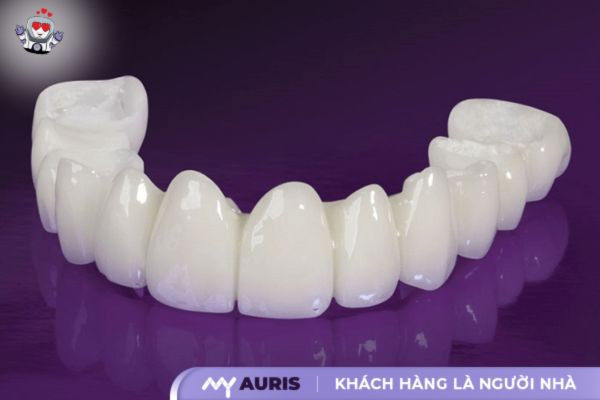
German E-max porcelain teeth
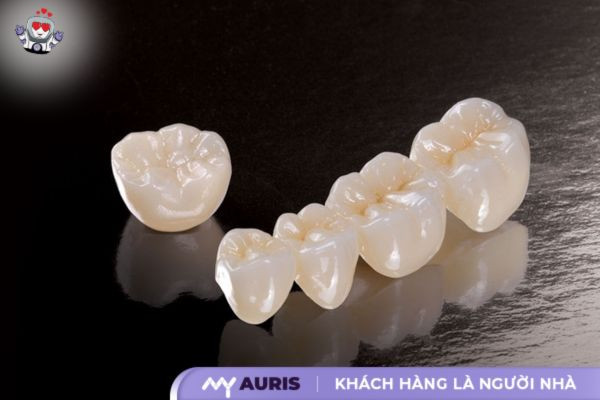
German IPS Empress porcelain teeth
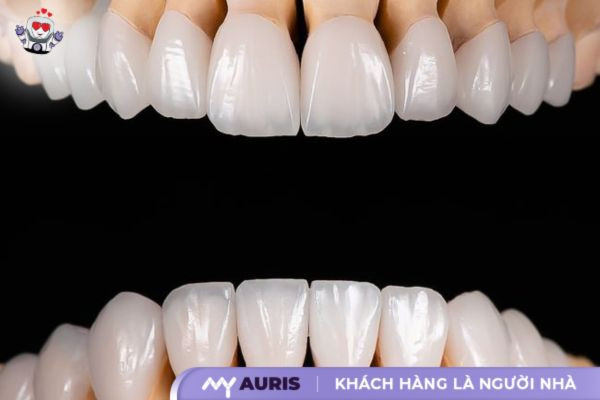
Compare different types of porcelain teeth Germany
High
Good
High
Teeth withstand chewing force large
E-max
High
Very good
High
Incisors and teeth subjected to moderate chewing force
IPS Empress
Low
Very good
High
Incisors
How to recognize German porcelain teeth
Check the material and brand
Check durability and aesthetics
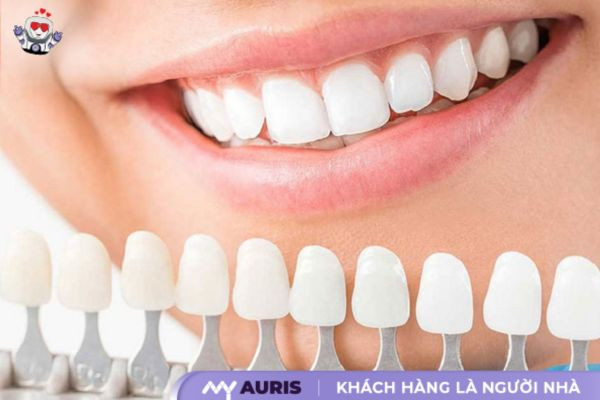
Check the origin
The cost of making German porcelain teeth
Factors affecting cost
Price comparison table for porcelain teeth Germany
Type of porcelain teeth
Average price (VND/tooth)
Zirconium porcelain teeth Germany
7,000,000 – 12,000,000
E-max porcelain teeth Germany
6,000,000 – 10,000,000
IPS Empress porcelain teeth Germany
5,000,000 – 8,000,000
Process of making German porcelain teeth
Examination and consultation
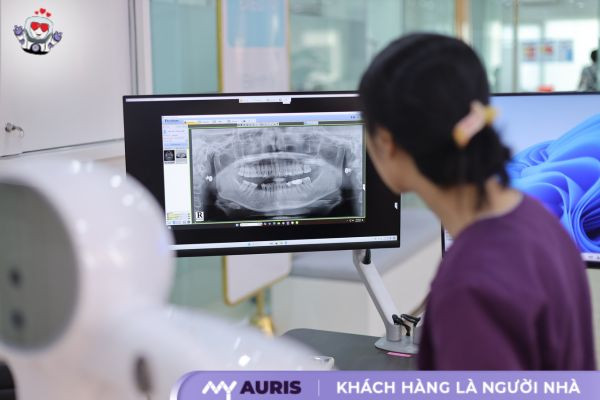
Teeth preparation
Taking tooth impressions
Ceramic tooth manufacturing
Porcelain teeth attached
Caring for German Porcelain Teeth
Daily oral hygiene
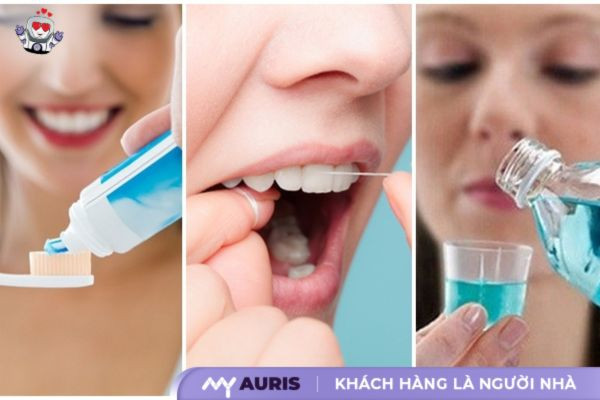
Check alignment period
Avoid bad habits






